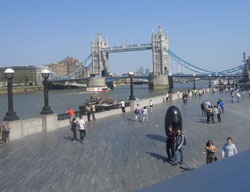

Illegal Indians quitting recession-hit UK?
PTI
 London, 13 May 2012: Amidst a tougher immigration regime under the David Cameron government, dwindling job opportunities and double-dip recession, many Indian citizens who entered Britain illegally to chase their ’London Dreams’ are returning home, official figures show.
London, 13 May 2012: Amidst a tougher immigration regime under the David Cameron government, dwindling job opportunities and double-dip recession, many Indian citizens who entered Britain illegally to chase their ’London Dreams’ are returning home, official figures show.
As a newly-formed task force moves to clear ’slums’ with illegal immigrants in Southall and elsewhere, the figures show an increase in the number of such Indians (who entered the country illegally) seeking official help to return to India.
For many Indian citizens who brave hazardous journeys across continents and wily human traffickers with hopes of a better life, their dreams often turns into a veritable nightmare, and are reduced to living in slum-like conditions here.
The number of those returning may be small compared to the overall number of illegal immigrants, but the figures show an increase since 2009, reflecting tougher action by the UK Border Agency (UKBA) as well as a willingness - even if reluctant - to return home.
Many who destroy their passports to prevent deportation go through the complex task of re-establishing their Indian identity and obtain emergency travel documents (ETD) from the Indian high commission here to return home.
Others seek to return after being frustrated by the lack of petty job opportunities.
Such individuals are apprehended by the UKBA, which refers their cases to the high commission to establish their identity for eventual repatriation to India.
It is the host country’s responsibility to check illegal immigration.Figures show an increase in the number of such individuals referred by UKBA to the high commission. There is also an increase in the number of individuals whose Indian identity is already established being issued ETDs.
According to a high commission note, "there have also been instances where non-Indians were sought to be repatriated to India which was averted once the verification process established that they were not Indians".
From 1,006 individuals referred by UKBA to the high commission in 2009 to establish their Indian identity before repatriation, the number went up to 1,378 in 2011.
Between 2009 and 2011, UKBA referred 3,575 cases, of whom, after establishing their Indian identity mainly through police verification in India, the high commission issued ETDs to 1,737 individuals.
During the same period, ETDs were issued to 2,673 individuals whose Indian identity was established on the basis of documents already available with them here.
The high commission note said, "There are a large number of cases where Indian identity of individuals has been established after verification process and UKBA has been duly informed to facilitate their return."
On any day, the illegal Indians can be seen huddled together in parts of London and towns with significant presence of Indian origin people, such as Leicester, Birmingham and Manchester.
In popular parlance, the illegal Indians are pejoratively called ’faujis’.
Ashamed to return home without realising their ’London Dreams’, many are reduced to scrounging for food, petty stealing, crime and addiction to alcohol and drugs.
Savyasaachi Jain, noted film-maker who produced the acclaimed documentary titled ’Door Kinare’ (Shores Far Away), highlighting the plight of illegal Indian immigrants, told PTI that those who had their dreams shattered wanted to warn others "not to be mad" to try and come here.
"When I was making my film, I met many men who were destitute. They were living on the fringes of British society, homeless and sleeping rough. They weren’t making any progress here, and neither were they able to go back – to return home without having been successful would mean a huge loss of face, apart from the loss of the amount invested in travel," Jain said.
"It’s a very desperate and stressful situation, and drug and alcohol abuse is common. These people are not criminals, they are enterprising young men who set out to make their fortune," he added.
"But in this country they have no social capital, nobody to turn to. They don’t have the support networks that they would have in their villages back home," Jain noted.